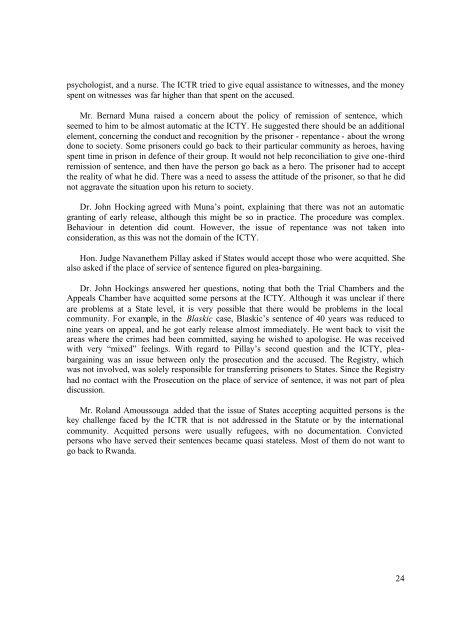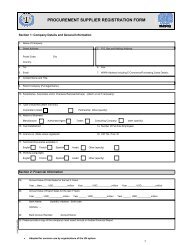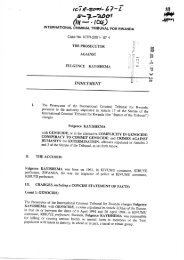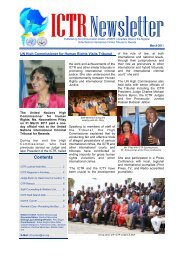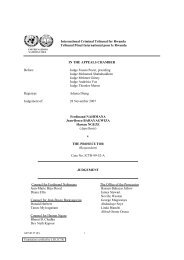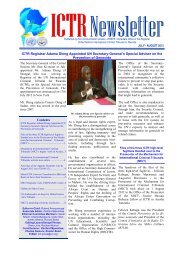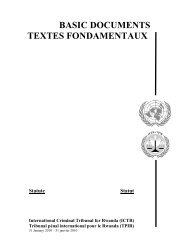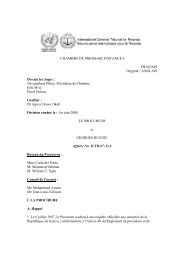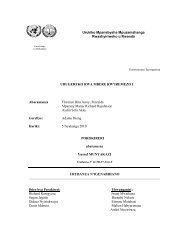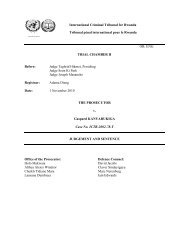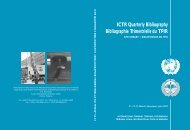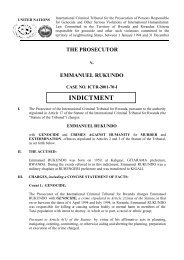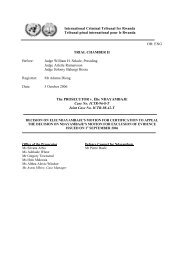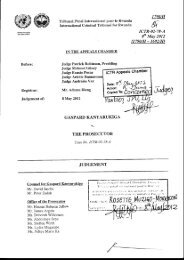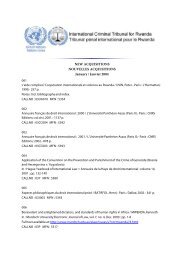Report of Proceedings - International Criminal Tribunal for Rwanda
Report of Proceedings - International Criminal Tribunal for Rwanda
Report of Proceedings - International Criminal Tribunal for Rwanda
You also want an ePaper? Increase the reach of your titles
YUMPU automatically turns print PDFs into web optimized ePapers that Google loves.
psychologist, and a nurse. The ICTR tried to give equal assistance to witnesses, and the money<br />
spent on witnesses was far higher than that spent on the accused.<br />
Mr. Bernard Muna raised a concern about the policy <strong>of</strong> remission <strong>of</strong> sentence, which<br />
seemed to him to be almost automatic at the ICTY. He suggested there should be an additional<br />
element, concerning the conduct and recognition by the prisoner - repentance - about the wrong<br />
done to society. Some prisoners could go back to their particular community as heroes, having<br />
spent time in prison in defence <strong>of</strong> their group. It would not help reconciliation to give one-third<br />
remission <strong>of</strong> sentence, and then have the person go back as a hero. The prisoner had to accept<br />
the reality <strong>of</strong> what he did. There was a need to assess the attitude <strong>of</strong> the prisoner, so that he did<br />
not aggravate the situation upon his return to society.<br />
Dr. John Hocking agreed with Muna’s point, explaining that there was not an automatic<br />
granting <strong>of</strong> early release, although this might be so in practice. The procedure was complex.<br />
Behaviour in detention did count. However, the issue <strong>of</strong> repentance was not taken into<br />
consideration, as this was not the domain <strong>of</strong> the ICTY.<br />
Hon. Judge Navanethem Pillay asked if States would accept those who were acquitted. She<br />
also asked if the place <strong>of</strong> service <strong>of</strong> sentence figured on plea-bargaining.<br />
Dr. John Hockings answered her questions, noting that both the Trial Chambers and the<br />
Appeals Chamber have acquitted some persons at the ICTY. Although it was unclear if there<br />
are problems at a State level, it is very possible that there would be problems in the local<br />
community. For example, in the Blaskic case, Blaskic’s sentence <strong>of</strong> 40 years was reduced to<br />
nine years on appeal, and he got early release almost immediately. He went back to visit the<br />
areas where the crimes had been committed, saying he wished to apologise. He was received<br />
with very “mixed” feelings. With regard to Pillay’s second question and the ICTY, pleabargaining<br />
was an issue between only the prosecution and the accused. The Registry, which<br />
was not involved, was solely responsible <strong>for</strong> transferring prisoners to States. Since the Registry<br />
had no contact with the Prosecution on the place <strong>of</strong> service <strong>of</strong> sentence, it was not part <strong>of</strong> plea<br />
discussion.<br />
Mr. Roland Amoussouga added that the issue <strong>of</strong> States accepting acquitted persons is the<br />
key challenge faced by the ICTR that is not addressed in the Statute or by the international<br />
community. Acquitted persons were usually refugees, with no documentation. Convicted<br />
persons who have served their sentences became quasi stateless. Most <strong>of</strong> them do not want to<br />
go back to <strong>Rwanda</strong>.<br />
24


